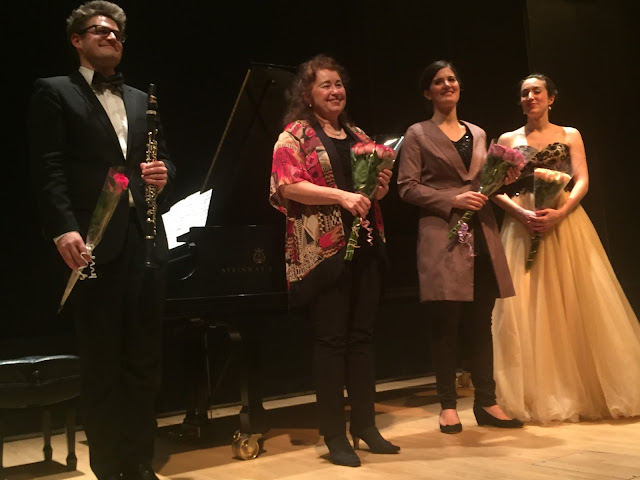 |
| Sebastian Lambertz, Babette Hierholzer, Eva-Maria Summerer, Laure Barras |
With the illustrious pianist Babette Hierholzer (Artistic Director of the German Forum) accompanying two superb singers and the welcome contributions of clarinetist Sebastian Lambertz, nothing was wanting in this celebration of German music. The goal of the German Forum is to present outstanding young artists from the German-speaking world and, judging by the past couple recitals we've reviewed, they achieve this goal admirably.
President Henry Meyer-Oertel welcomed the audience and introduced the sponsors and notables in the audience as well as the young artists, and did so with grace and good humor which put everyone in the mood to have a good time. And so we did.
Swiss soprano Laure Barras opened the program with "Mein Herr Marquis" (otherwise known as Adele's "laughing song") from Johann Strauss' operetta Die Fledermaus. We have reviewed this very same aria twice already this week but let us say we heard it afresh from Ms. Barras.
What distinguishes her is not only the brightness and clarity of her voice but her total immersion in the character and the originality of her interpretation. Her Adele was considerably inebriated but that did not result in careless diction. Au contraire, every word was clear and, if you understood German, it was hilarious. And if you didn't understand the words, you could not fail to appreciate the facial expressions and gestures. The fioritura was as clear as champagne and just as bubbly.
And then along came dusky-voiced mezzo soprano Eva-Maria Summerer singing Prince Orlofsky's aria "Ich lade gern mir Gäaste ein" which we have always called "Chacun à son goût". If the entire recital had been from Die Fledermaus we would have not complained. How delightful!
Clarinetist Sebastian Lambertz is performing his graduation recital from Mannes College on 12/4 and, in light of his enormous talent and onstage poise, we found it hard to believe that he is a student. He joined Ms. Hierholzer and Ms. Barras for the lyrical Schubert lied "Der Hirt auf dem Felsen", in which the clarinet echoes the voice. His lyricism was sustained throughout the register with dynamics under perfect control and some ear-tickling trills.
Dare we suggest that Ms. Barras' Swiss background gave her the edge in yodeling? Indeed, the way Schubert wrote it and the three artists performed it, one could easily visualize the lonely shepherd pining for his love in a distant inaccessible valley, with only the echo of the clarinet to keep him company. Just listen to the joyous major key when he realizes that Spring is coming and the snow will melt and he will see his sweetheart once again. The increase in tempo translated into great excitement.
Mr. Lambertz had his solo moment at the end of the program when he switched to his A clarinet, performing Francis Poulenc's Sonata for clarinet and piano. He has a terrific technique and a most expressive lyricism. As one might have predicted, we favored the second movement "Romanza" in which one of the motifs reminded us of Prokofiev's music for the ballet--Romeo and Juliet. The final movement could only be described as frisky.
We felt fortunate to hear some duets, which we always enjoy. Yes, we heard "Abendsegen" from Engelbert Humperdinck's Hansel und Gretel just a few days ago, but hearing it in perfect German was a special treat. We also enjoyed the scene of the presentation of the silver rose by young Octavian to Sophie, his cousin's intended bride. Richard Strauss' Der Rosenkavalier has some gorgeous orchestral colors which Ms. Hierholzer captured in the piano. There is nothing as satisfying as two voices in harmony!
There were two humorous folksongs which Ms. Barras introduced with a most charming manner. We would wager that she has had quite a bit of dramatic training since she so effectively inhabits the character of the text--first the ambivalent Babette (!) from Haydn's "Eine sehr gewöhnliche Geschichte" and the pubescent girl of Brahms "Och Moder, ich well en Ding han". We are not sure what dialect of German that was but both songs were rendered with great humor.
Ms. Summerer also had her chance to sing with clarinet in Brahms' Zwei Gesänge op. 91, originally written for voice and viola. Her voice has a firmness and breadth in the lower register that is quite appealing.
We had only one minor quibble and we have been quibbling about this for quite some time. We would hope that singers would memorize their arias and not use music stands. The singers made much more of an impression when they sang "off book".
(c) meche kroop
No comments:
Post a Comment